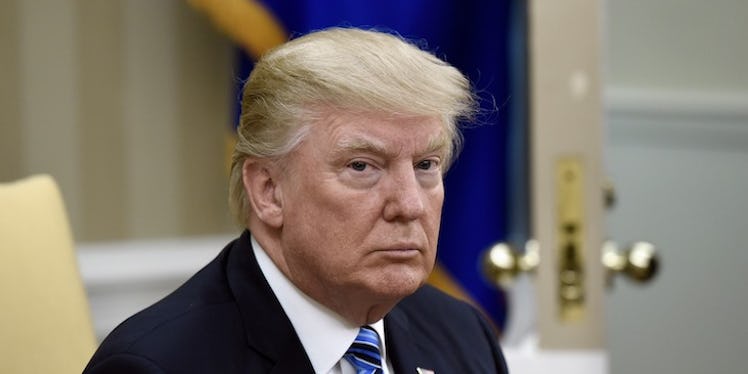
Trump's "14 Words" Speech Raises Concerns About White Supremacy
In the past, President Trump and his ilk have been accused of "dog whistle politics" -- using coded language to communicate specific (usually white supremacist) messages while addressing a general audience.
His frequent mentions of Islamic extremism and the explicit statements that the travel ban is targeted at majority Muslim countries do nothing to combat that notion.
And with the speech President Trump gave in Poland on July 6, accusations of dog whistling have come roaring back to the national conversation.
As The Atlantic wrote yesterday, Trump's frequent references to "our society," "the west," and "shared enemies" is coded white nationalist language. (Presidential adviser Steve Bannon, per The Atlantic, once mentioned in a 2014 speech "the long history of the Judeo-Christian West struggle against Islam.")
While some may say that these are just words, context matters. In the speech, Trump mentions "the Polish experience" in regard to defending the west. Right now, the European Union is taking legal action against Poland (along with the Czech Republic and Hungary) for their refusal to let in refugees, many of whom are Muslim. This goes hand-in-hand, thematically speaking, with Trump's travel ban, which is officially the Executive Order for "Protecting The Nation From Foreign Terrorist Entry Into The United States." The Washington Post reported that the law upon which the order is based was originally intended to "protect" the U.S. from communists and Jews.
Several have mentioned that when he talked about protecting the west, Trump meant democracy. But as The Atlantic points out,
Trump mentioned [democracy] once. And for good reason. Ideologically, what links the current American and Polish governments is not their commitment to democracy—both are increasingly authoritarian. It is their hostility to Muslim immigration.
And, again, while the similarities may just be an unfortunate coincidence, that raises the question: How many coincidences have to happen before we realize there is a deliberate, manufactured pattern here?
And the pattern continues with Trump's surrogates. Earlier today, Sarah Palin tweeted a link to a post by Young Conservatives, an alt-right blog, that mentioned a loaded phrase -- "14 words" -- which has people wondering if the dog whistles are transitioning into overt speech.
The 14 words are, per the Anti-Defamation League, a reference to a popular white supremacist slogan: "We must secure the existence of our people and a future for white children."
Others noticed the suspicious language in Palin's tweet:
But there is no explicit mention of "14" or "fourteen" in the article Palin linked. So, to what 14 words is she referring?
Of the pull quotes Young Conservatives includes, the following are 14-word sentences (or 14-word complete thoughts):
Do we have the confidence in our values to defend them at any cost? Our freedom and our civilization depend on these bonds of history, culture, and memory Let us all fight like the Poles. For family, freedom, for country, for God. We must stand united against these shared enemies to rip them of their territory.
All of these phrases have coded white nationalist undertones: our "values," our "civilization," united against these shared enemies. They are all conceptually related to the 14 words in that they refer to securing the west's future from certain enemies. (Trump also questioned, in his speech, whether the west has "the will to survive," which is ideologically similar to securing existence for white people.)
One Twitter user (and, later, The Daily Beast) questioned whether or not Palin was dog whistling by pointing out that Palin's tweet was an auto-post from Facebook:
And if you look at the original social title of the post (still up on her Facebook), you see that the Young Conservatives social title of the same post we link to above also mentions "14 words" -- so she herself didn't choose the phrase "14 words."
But the post has, at the time of publication, been up for almost 12 hours. Palin has not commented or offered clarification, which implies tacit support -- or, at the very least, indifference. (And indifference to white supremacy is, itself, alarming.)
Why, you may ask, does something Sarah Palin says or does have anything to do with Trump? He can't control her.
True. But given that Palin is a vocal Trump supporter who stumped for him, and she even visited the Trump White House as a guest (along with Ted Nugent, who has posted virulently Islamophobic and antisemitic screeds in the past), it's not farfetched to assume that the often marble-mouthed former vice presidential candidate is still speaking for Trump.
At the same time, whether or not Palin speaks for Trump is almost beside the point. The fact of the matter is that his rhetoric ignites something in white supremacists and has led to a spike in reported hate activity and racially motivated bullying. Words matter. The words of someone who is supposed to be the most powerful person in the world definitely matter.